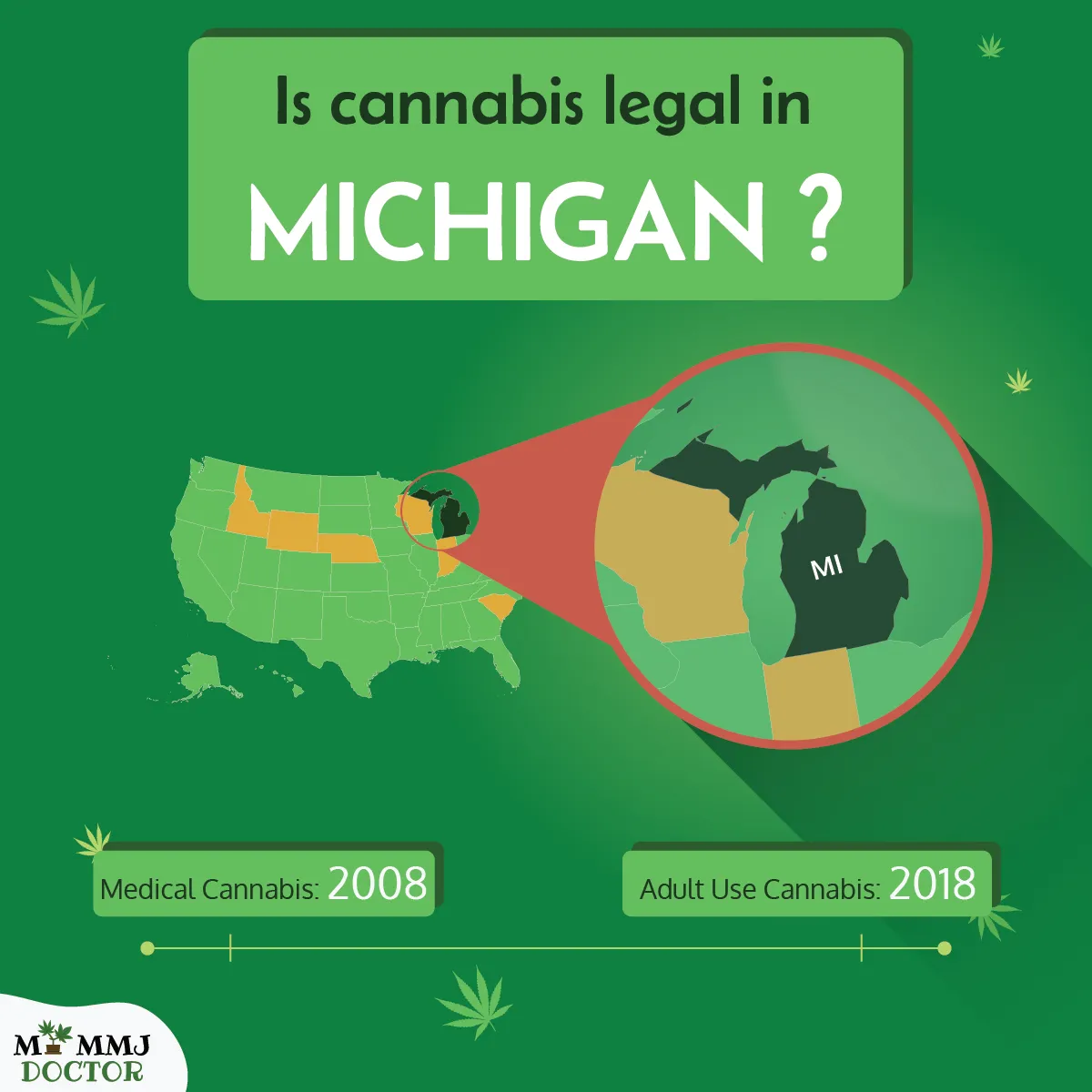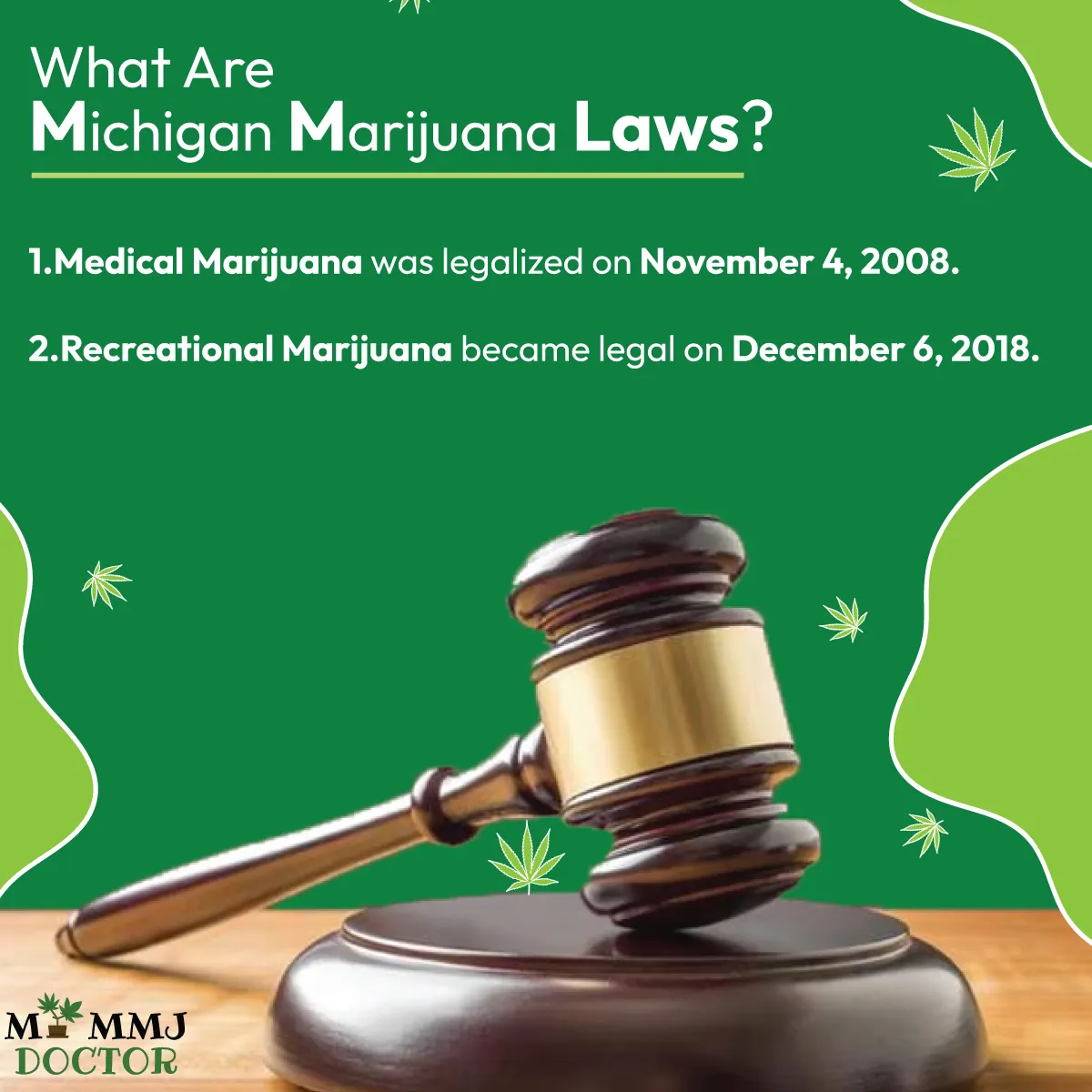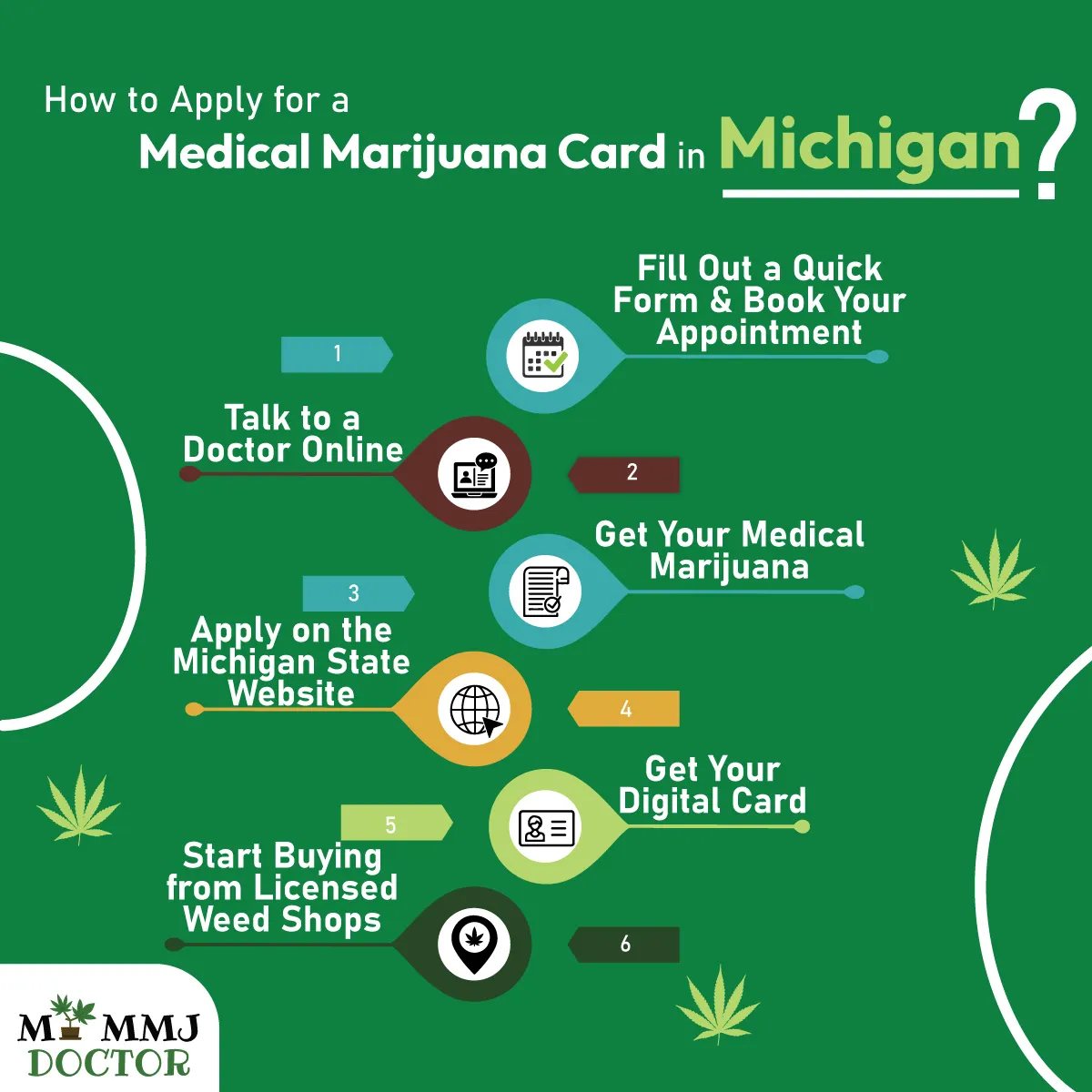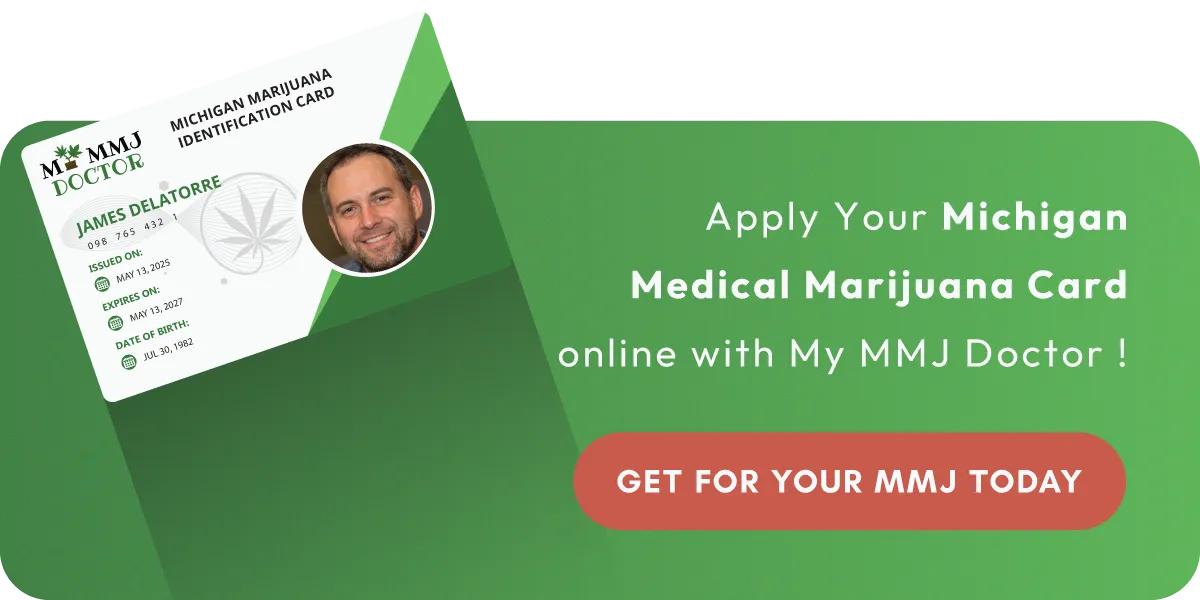
Key Points:
- Legal Status: Medical marijuana was legalized in Michigan in 2008, with recreational use following in December 2018.
- Possession Limits: Patients can possess up to 2.5 ounces, with a monthly cap of 10 ounces. Recreational users can possess up to 2.5 ounces.
- Cultivation: Medical patients and caregivers can grow up to 12 plants per patient, up to a maximum of 72 plants. Recreational users can grow up to 12 plants per household.
- Tax Rates: Medical marijuana is taxed at 6%, while recreational marijuana has a 16% tax rate.
- Qualifying Conditions: Conditions such as cancer, PTSD, chronic pain, and more qualify patients for a medical marijuana card.
- Caregiver Requirements: Caregivers must be 21+, pass a background check, and assist up to 5 patients.
- Card Renewal: Medical marijuana cards must be renewed every two years, with renewal starting 90 days before expiration.
- Public Consumption: Smoking marijuana in public places is prohibited.
- Gun Ownership: Medical marijuana patients can legally own firearms with a valid Concealed Pistol License (CPL).
- Age Requirements: Recreational use is for adults 21+, while minors may use medical marijuana with parental consent.

When Did Marijuana Become Legal In Michigan?
Marijuana became legal for medical use in Michigan on November 4, 2008, when voters approved the Michigan Compassionate Care Initiative, also known as Proposal 1. At the same time, Michigan legalized recreational marijuana on December 6, 2018, after voters passed Proposal 1 during the November 2018 election. The new law allows adults 21 and older to possess, use, and grow limited amounts of cannabis for personal use.
Proposal 1 law allowed patients with qualifying medical conditions to legally possess up to 2.5 ounces of cannabis and grow up to 12 plants for personal medical use, with a physician’s approval. It also permitted caregivers to assist patients with cultivation and use. Although the law didn’t officially authorize dispensaries, many began operating in a legal gray area.
Michigan became the 13th state—and the first in the Midwest—to legalize medical marijuana, passing the initiative with strong public support (63% in favor, 37% against), despite resistance from some law enforcement and federal officials at the time.
In February 2013, the Michigan Supreme Court ruled that the 2008 law did not allow dispensaries to operate, placing dozens of existing businesses in legal jeopardy.
Significant legislative reforms came in September 2016, when Governor Rick Snyder signed a series of bills that:
- Formally legalized and regulated medical marijuana dispensaries
- Imposed a 3% tax on medical marijuana sales
- Permitted non-smokable cannabis forms, such as edibles and topicals
These reforms laid the groundwork for a well-regulated medical cannabis system in Michigan and paved the way for full recreational legalization.

Why Do You Still Need A Medical Marijuana Card In Michigan If Weed Is Legal?
Since recreational cannabis is legal in Michigan, many assume a medical marijuana card is no longer necessary; that’s not entirely true. Having a card can still offer several important advantages:-
- Save money – Medical marijuana is only taxed at 6%, while recreational cannabis is taxed at 16%. That lower rate can lead to substantial savings over time, especially for frequent users.
- Higher possession limits –While recreational users 21+ can carry up to 2.5 oz, including a maximum of 15g of concentrate, medical cardholders can also carry up to 2.5 oz but aren’t subject to the 15g concentrate, allowing more flexibility in the form of cannabis they carry.
- Access for patients under 21 – Only medical patients under 21 are legally allowed to use cannabis for health reasons.
- Priority during shortages – In times of supply issues, medical patients are given priority access to products.
What Are The Possession And Cultivation Limits In Michigan?
| Category | Medical Marijuana Patients | Recreational Users (21+) |
|---|---|---|
| Purchase Limits | ✅ Up to 2.5 oz per day; no more than 10 oz per month | Up to 2.5 oz at a time, including up to 15g of concentrate |
| Public Possession | Up to 2.5 oz | Up to 2.5 oz, including up to 15g of concentrate |
| Home Possession | ✅Up to 10 oz at home; no limit on personal harvest | Up to 10 oz at home; no limit on harvested cannabis |
| Home Cultivation | ✅ Medical patients and caregivers may grow up to 12 plants per patient, with caregivers allowed a maximum of 72 plants. | Recreational users are limited to 12 plants per household, regardless of the number of adults living there. |
| Cultivation Requirements | Plants must be grown in a locked, enclosed space | Plants must be grown in a locked, enclosed space |
What Are The Penalties For Marijuana Possession And Cultivation In Michigan?
Penalties for Illegal Possession:
| Offense | Details | Penalty |
|---|---|---|
| Possession Over Legal Limit (2.5 oz to 5 oz) | First offense | Civil infraction: Up to $500 fine and forfeiture of marijuana |
| Possession Over Legal Limit (Over 5 oz) | First offense | Misdemeanor: Up to $500 fine; jail time possible if violence or commercial intent is involved |
| Possession Near a Park (within 1,000 ft) | Any amount | Misdemeanor or felony (judge’s discretion): Up to 2 years in jail and $2,000 fine |
Penalties for Illegal Cultivation:
| Offense | Details | Penalty |
|---|---|---|
| Home Cultivation (Up to 12 plants) | Personal use at home | Legal if not visible to public and in a secure area |
| Home Cultivation (Plants visible from public or not secured) | Any number of plants | Civil offense: Up to $100 fine and forfeiture of marijuana |
| Home Cultivation (13-24 plants) | Personal use | Civil infraction: Up to $500 fine; no jail time |
| Home Cultivation (25-200 plants) | Personal use | Felony: Up to 7 years imprisonment |
| Home Cultivation (Over 200 plants) | Personal use | Felony: Up to 15 years imprisonment |
How Much Is The Marijuana Tax In Michigan?
When buying marijuana in Michigan, taxes depend on whether it’s for medical or recreational use:
Medical Marijuana Tax:
- Legal for patients with a valid medical marijuana card.
- No excise tax on medical marijuana purchases.
- 6% state sales tax still applies.
Recreational Marijuana (Adult Use) Tax:
- 10% excise tax on all recreational marijuana sales.
- 6% state sales tax also applies.
- Both taxes are collected by the Michigan Department of Treasury.
What Medical Conditions Make You Eligible For A Medical Marijuana Card In Michigan?
Below are the qualifying conditions for a Michigan medical marijuana card:
- A chronic or debilitating disease or medical condition or its treatment that produces 1 or more of the following:
- Cachexia or Wasting Syndrome
- Severe and Chronic Pain
- Severe Nausea
- Seizures (Including but not limited to those characteristic of epilepsy)
- Severe and Persistent Muscle Spasms (Including but not limited to those characteristic of multiple sclerosis)
- Agitation of Alzheimer’s Disease
- AIDS
- Amyotrophic Lateral Sclerosis
- Arthritis
- Autism
- Cancer
- Cerebral Palsy
- Chronic Pain
- Colitis
- Crohn’s Disease
- Glaucoma
- Hepatitis C
- HIV Positive
- Inflammatory Bowel Disease
- Nail Patella
- Obsessive Compulsive Disorder
- Parkinson’s Disease
- Post-Traumatic Stress Disorder
- Rheumatoid Arthritis
- Spinal Cord Injury
- Tourette’s Disease
- Ulcerative Colitis

How To Apply For A Medical Marijuana Card In Michigan?
Step 1: Book an Appointment
Start by filling out a brief form with your personal and medical details to help the doctor assess your eligibility for medical cannabis.
Step 2: Connect and Consult
Next, you’ll have a private consultation with a certified physician. You can choose to meet in person or conveniently online through My MMJ Doctor – a trusted platform connecting patients to licensed professionals.
During your evaluation, the doctors will review your medical history and determine if you qualify for medical cannabis in Michigan. You’re encouraged to ask questions about how medical marijuana can help your condition, what dosage is appropriate, how to consume it (flower, tinctures, edibles, oils, etc.), and any other MMJ-related concerns.
Step 3: Receive Your Doctor’s Recommendation
If approved, you’ll receive your official medical marijuana recommendation as a PDF by email, often on the same day as your appointment. This document is required to apply to the state.
Step 4: Prepare the Necessary Documents
Before registering with the state, be sure you have:
- A valid Michigan State ID or Driver’s License
- The doctor’s recommendation we provide
- The $40 state application fee (This fee is paid directly to the state. If you are appointing a caregiver, a separate caregiver fee also applies.)
Step 5: Register with the State of Michigan
Visit the Michigan Medical Marijuana Program (MMMP) portal and complete your online registration. Upload your documents, submit your recommendation, and pay the $40 fee. We provide clear guidance throughout the process if you need help.
Step 6: Get Your Medical Marijuana Card
Once approved by the state, you’ll receive a digital confirmation that allows you to immediately start purchasing from dispensaries. Your physical MMJ card will be mailed to you within a few weeks.
Step 7: Purchase from State-Approved Dispensaries
With your medical marijuana card, you can legally purchase cannabis from licensed dispensaries across Michigan.
What We Charge: $149 – Simple, Transparent & Affordable
Our flat-rate fee of $149 includes:
- Doctor consultation (online or in-person)
- Same-day PDF recommendation via email (if approved)
- Step-by-step guidance for state registration
- No hidden fees
- 100% money-back guarantee if not approved
- Full HIPAA compliance to protect your medical privacy
How To Renew Your Michigan Medical Marijuana Card?
The renewal process is the same as applying for a new card.
- Patients without caregivers can renew online through the Cannabis Regulatory Agency (CRA) website.
- Minors and adults with caregivers must renew by completing and submitting the MMMP Application Packet, or the MMMP Minor Application Packet for patients under 18.
- We will send you a renewal email reminder within the 90-day renewal window to make sure you renew on time—our renewal service in Michigan costs just $129.
Conclusion
Take the first step today by consulting with a licensed doctor and registering with the Michigan Medical Marijuana Program.
FAQs
- How do I get a medical marijuana card in Michigan online?
To get a medical marijuana card online in Michigan, book an appointment with a certified doctor with My MMJ Doctor, get approved for a qualifying condition, and register with the Michigan Medical Marijuana Program (MMMP) through the official state portal.
- How much weed can you buy in Michigan per day?
Both medical patients and recreational users can legally purchase up to 2.5 ounces of marijuana per day in Michigan, with a monthly medical limit of 10 ounces.
- How long does it take to get a medical marijuana card in Michigan?
After submitting your application and doctor’s certification, you’ll receive a digital approval within 24–48 hours. The physical card typically arrives by mail within 2 to 3 weeks.
- How many marijuana plants can I grow in Michigan?
Michigan allows adults 21+ to grow up to 12 marijuana plants per household for personal use. Medical patients or caregivers may grow 12 plants per patient, up to a maximum of 72 plants if the caregiver has 5 patients and is also a patient.
- Can You Own a Gun with a Medical Marijuana Card in Michigan?
Yes, you can. While Michigan allows medical marijuana patients to own firearms with a valid Concealed Pistol License (CPL), federal law still prohibits firearm possession by cannabis users. Patients should consult legal counsel to fully understand the risks.
- Is it illegal to smoke weed in public in Michigan?
Yes, smoking marijuana in public places is illegal in Michigan. Use is only permitted on private property where consumption is allowed by the property owner.
- At what age can you smoke weed in Michigan?
You must be at least 21 years old to use recreational marijuana in Michigan. For medical use, you can apply as a minor with parental consent, but adult patients are typically 18 or older.
- Do non-residents pay taxes on medical marijuana purchases in Michigan?
Yes, non-residents of Michigan must pay the 6% sales tax on medical marijuana purchases. However, they cannot obtain a Michigan medical marijuana card, so they would not benefit from the lower tax rate.
- Can you enter a medical marijuana dispensary in Michigan without a medical card?
Yes, adults 21+ can enter recreational dispensaries without a medical card. However, to access medical dispensaries, a valid Michigan MMJ card is required.
Related Articles
How to Get a Medical Marijuana Card in Maryland?
How Can You Obtain Your Medical Marijuana Card in Maryland in 2025?Are you a Maryland resident seeking a way to manage your symptoms naturally? You came to the right place. Maryland has a medical marijuana program that allows eligible...
Benefits You Are Missing Without a Michigan MMJ Card
Top Benefits of a Michigan Medical Marijuana CardIf you live in Michigan and already use cannabis, you likely know it’s easy to access. However, many people don’t realize that having a Michigan medical marijuana (MMJ) card offers additional...
What are the Michigan Medical Marijuana Laws?
What are the Michigan Medical Marijuana Laws?Medical marijuana has been legal in Michigan since 2008, helping thousands of residents manage chronic pain, anxiety, cancer symptoms, and more. But knowing what’s allowed - and what’s not - can...







0 Comments